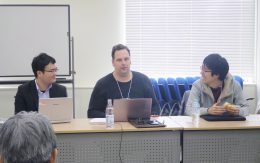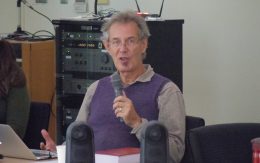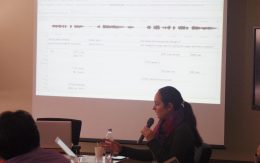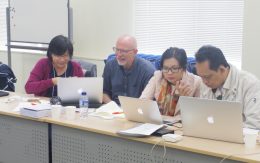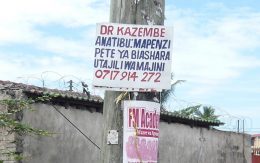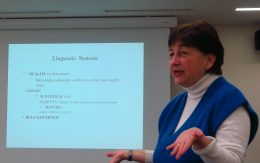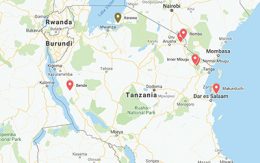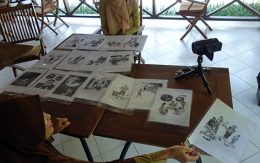Activities
Date:2018.03.19[Mon]- 03.23[Fri]
SCOPIC workshop
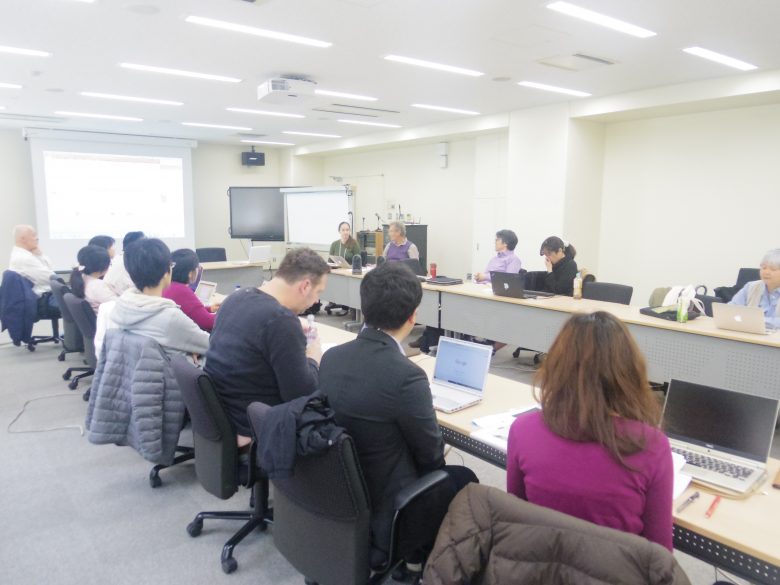
*This event has already been held.
The Social Cognition Parallax Interview Corpus (SCOPIC) is an open-ended, accessible multilingual corpus annotated with functional categories relevant to social cognition. Social Cognition is the knowledge of social facts (e.g. kinship, status, ownership) that people use to place themselves and others within an interconnected social context, and the psychological facts about their own feelings, attentions, desires and their estimations of these for others (cf. Frith & Frith 2007). By ‘parallax corpus’ we mean ‘broadly comparable formulations resulting from a comparable task’ (cf. Friedrich 1986), to avoid the implications of ‘parallel corpus’ that there will be exact semantic equivalence across languages. The corpus project uses an innovative stimulus-elicitation methodology in a language documentation context, resulting in exposition, cooperative conversation and narrative data (San Roque et al. 2012).
The purpose of the SCOPIC – TUFS Workshop will be
- to introduce the project to workshop participants,
- show them in a hands-on way how to work with the stimulus materials as a method of exploring how particular languages encode aspects of social cognition,
- support participants in their own annotation in the functional domains of human referent expression and reported speech, thought and emotion.
Human referent expression is how we refer to ourselves and other humans. How language users refer to people shows our characterization of roles and relationships (or lack thereof). In using language, we build or break down these characterizations and relationships. We have a choice of which aspects of people we highlight or downplay when we talk about them and ourselves, particularly when we use lexical (non-pronominal) reference. The language use we attribute to others shows our estimation of others’ relationship conceptualization.
Reported Speech, thought and emotion is the domain of how thoughts, feelings and beliefs are expressed, by a range of linguistic mechanisms from complement clauses to quoted speech and, in the latter case, ranging from direct to indirect speech. Further relevant here is whether imputed speech expresses outer or inner worlds, and whether it expresses speech, thoughts, feelings or beliefs.
The workshop days (19–23 March, 10am–4pm) will feature talks on social cognition generally, the corpus and annotation schemata, and language profiles. Each workshop day will also have blocks of time for workshop participants to annotate their own data, with help from the workshop organizers. We will endeavour to provide technical support with the ELAN software, as well as support with application of the annotation schema and discussion of the sometimes tricky questions of linguistic analysis that underlie it. The workshop will also provide the opportunity for workshop participants to provide feedback and engage in discussion about interesting categories and patterns they see in their own data.
* This workshop consists of talks and practical sessions. The talks are open to the public, while registeration is required for participating in the practical sessions. For application, please fill out the application form below by 14 March (Wed.).
Date/Time
19 (Mon.)–23 (Fri.), March 2018
10:00–16:00
Venue
Room 304, 3F, ILCAA, TUFS
Speakers
- Nicholas EVANS (Australian National University)
- Danielle BARTH (Australian National University)
- I Wayan ARKA (Australian National University)
- Stefan SCHNELL (University of Melbourne)
- Eka PRATIWI (College of Foreign Languages (STIBA) Saraswati Denpasar)
Participants
- Seongha RHEE (Hankuk University of Foreign Studies)
- Yanti (ILCAA Joint Researcher, Atma Jaya Catholic University of Indonesia)
- Heiko NARROG (Tohoku University)
- Toshiki OSADA (Research Institute for Humanity and Nature)
- Hitomi ONO (Reitaku University)
- Yukinori KIMOTO (Nagoya University)
- Akiko YOKOYAMA (NINJAL)
- Keita KURABE (ILCAA Junior Research Fellow, University of Melbourne)
- Asako SHIOHARA (ILCAA)
- Norikazu KOGURA (ILCAA)
Program
In the following table, talks are listed with an asterisk(*).
19 March (Mon.)
10:00–10:30
Introduction of workshop participants and the languages they work on
*10:30–11:30
Nick EVANS
Social Cognition (OPEN)
*11:30–12:00
Danielle BARTH
Corpus principles of SCOPIC (OPEN)
12:00–13:00
Lunch break
*13:00–14:00
Nick EVANS and Danielle BARTH
Human Referents through a lens of social cognition & SCOPIC coding schema
14:00–14:30
ELAN set up & annotation in groups
14:30–15:00
break
15:00–16:00
ELAN set up & annotation by individuals & groups
20 March (Tue.)
*10:00–10:40
Wayan ARKA
Human Referents and Social Meaning in Balinese: Some Evidence from the SCOPIC data
*10:40–11:20
Desak P. E. PRATIWI, Wayan ARKA, and Asako SHIOHARA
Benefactives and affectedness in Balinese: from morpho-syntax to social cognition
11:20–12:00
Annotation of Human Referents by workshop participants
12:00–13:00
Lunch break
13:00–14:30
Annotation of Human Referents by workshop participants
14:30–15:00
break
15:00–16:00
Round-table discussion of human referent issues of interest
21 March (Wed.)
*10:00–10:40
Nick EVANS
Social Cognition in Dalabon: a language portrait
10:40–12:00
Annotation of Human Referents by workshop participants
12:00–13:00
Lunch break
*13:00–14:00
Nick EVANS and Danielle BARTH
Reported Speech, thought and emotion through a lens of social cognition & SCOPIC coding schema
14:00–14:30
Annotation of Reported Speech, Thought & Emotion by workshop participants in groups
14:30–15:00
break
15:00–16:00
Annotation of Reported Speech, Thought & Emotion by individuals & groups
22 March (Thu.)
*10:00–10:40
Stefan SCHNELL
Social Cognition in Vera’a: a language portrait
10:40–12:00
Annotation of Reported Speech, Thought & Emotion by workshop participants
12:00–13:00
Lunch break
13:00–14:30
Annotation of Reported Speech, Thought & Emotion by workshop participants
14:30–15:00
break
15:00–16:00
Annotation of Reported Speech, Thought & Emotion by workshop participants
23 March (Fri.)
*10:00–10:40
Danielle BARTH
Reported Speech, Thought & Emotion in Matukar Panau
10:40–12:00
Annotation of Reported Speech, Thought & Emotion by workshop participants
12:00–13:00
Lunch break
13:00–14:30
Round-table discussion of Reported Speech, Thought & Emotion issues of interest
14:30–15:00
break
15:00–16:00
Final Discussion
Language
English
Admission
Free
Pre-registration
*Application has been closed.
The talks are open to the public, while registeration is required for participating in the practical sessions.
Jointly Organized by
- Core Project “Linguistic Dynamics Science3 (LingDy3)”, ILCAA, TUFS
- ILCAA Joint Research Project “Constructing a research network for documenting minority languages in and around Indonesia”
Application
*Application has been closed.
For application, please fill out the application form below by 14 March (Wed.).

